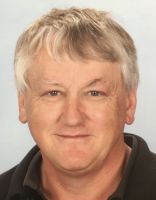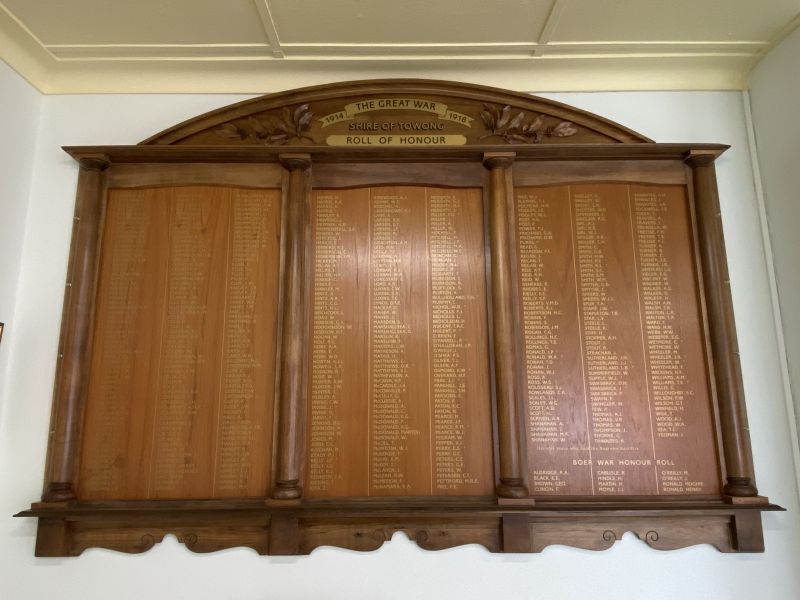Stephen Hertzog
Stephen was born in February of 1894 at Hawks’ View, near Albury. He was one of six children for Victor Anton and Jane Elizabeth (née Saunders) Hertzog. When he was young, the family moved over the border and settled in Bathanga. Stephen’s father was a well known miner in the Hawksview and Bethanga area. In the early days of mining around Bethanga, Victor discovered one of the best auriferous quartz reefs to be found in the area. Unfortunately, on the night of Sunday the 24th of June, 1906, he went out to check rabbit traps, but did not come back. He was found lying on the ground having died of heart failure. Upon leaving school, Stephen worked as a farm labourer.
Stephen married Irene Trenchard, the only daughter of J Trenchard of Bethanga, at St Augustine's Catholic Church in Wodonga on Tuesday the 7th of March, 1916. The Rev. Dr. Flynn officiated the wedding. According to newspaper sources, it was a “quiet wedding”. Two weeks after his wedding, he enlisted in AIF, and joined the newly raised 37th Battalion.
The battalion embarked on HMAT A34 Persic at Melbourne on the 3rd of June, 1917. It reached Plymouth, UK, on the 25th of July. After three months training in England with the 10th Training Battalion, Stephen proceeded overseas to France, and joined the 37th Battalion, 10th Infantry Brigade of the 3rd Australian Division.
In late February of 1917, Stephen was admitted to the 9th Field Field Ambulance suffering from an infection of his trachea or windpipe. He was released after a short three day stay at the Field Ambulance.
In June, Stephen experienced his first major battle when the battalion fought at Messines, in Belgium. The next major offensive would be in October, when the Allied armies launched an attack to gain control of Broodseinde Ridge. This position commanded the eastern approaches to the town of Ypres. It allowed German artillery observers to direct fire into the Allied positions. The 37th Battalion would take part as it belonged to the 3rd Australian Division.
On the first day of October the battalion was in camp at Winnezeele in France, organising and making preparations for the forthcoming attack on Broodseinde. They left camp the following day travelling in motor lorries to Ypres. From there they marched to the area beyond the Menin Gate and camped for the night. The attack was to begin at 0600 hours on the 4th with the battalion’s approach march commencing at 0945 hours. During the initial stage of the attack the Australian troops were heavily shelled on their start line with a seventh of their number becoming casualties even before the attack began. When the attacking troops started their trek across no-man's land they were confronted by a line of German troops coming towards them. In a quirk of planning, the Germans had chosen the same morning and time to launch an offensive of their own. The Australians prevailed, gaining all their objectives along the Broodseinde Ridge. The cost to the 37th Battalion was 49 men killed and 175 wounded. Amongst those killed was Private Stephen Hertzog. It’s not known how Stephen met his death. His Red Cross Society Wounded and Missing Enquiry Bureau file simply states that he was “buried by 37th Battn. Identity disc held by our Padre. At map location:- D.21.d 80.95.”
Back in Australia, Stephen left a grieving widow and a son, Lloyd Stephen Hertzog, who he had never met. In early 1918, Irene and Lloyd were granted a pension. Irene received 40/- (shillings) per fortnight backdated to the 23rd of December the previous year. Lloyd was granted a pension of 20/- per fortnight until the 27th of September 1932. Lloyd would marry later in life and have a family. He served with the 2/4th Australian General Hospital as a nursing orderly, rising to the rank of Lance Sergeant and serving both in Australia and overseas during the Second World War.
Stephen is remembered on the Australian War Memorial Roll of Honour, the Menin Gate Memorial in Ypres, Flanders, Belgium, and the Towong Shire Boer War and WW1 Roll of Honour. For his service during the First World War, he was awarded the British War Medal and the Victory Medal.
 Stephen Learmonth
Stephen Learmonth